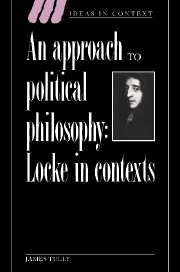1 - An introduction to Locke's political philosophy
Published online by Cambridge University Press: 20 November 2009
Summary
The political thought of John Locke (1632–1704) consists in work on and solutions to four problems that every major European political thinker faced in the seventeenth century. These are: the theoretical nature of government and political power, the relation of religion to politics, the practical art of governing, and the types of knowledge involved in religion and in political theory and practice. I discuss the first three problems in this chapter and the fourth in chapter 6. Of course his political thought and activity were provoked by and contributed to specific conflicts in England. However, neither these events nor the ways of thinking about them were unique to England. Like Locke, Grotius and Pufendorf experienced civil war, religious dissension and exile; Spinoza and Bayle suffered religious persecution; Colbert and deWitt invigilated mercantile systems; and they all shared a body of political concepts. Both the political, religious, and economic difficulties and the way in which these were thought to render political practice problematic were European-wide phenomena.
The difficulties that occasioned the four problems of government were of four kinds: the religious and civil wars of the sixteenth and seventeenth centuries; the administrative–productive consolidation of modern European states as effective governing units; the formation of a balance of power and trade system of military-commercial rivalry among states; and the European imperial struggle over the conquest, domination and exploitation of non-European populations and resources.
- Type
- Chapter
- Information
- An Approach to Political PhilosophyLocke in Contexts, pp. 9 - 68Publisher: Cambridge University PressPrint publication year: 1993



